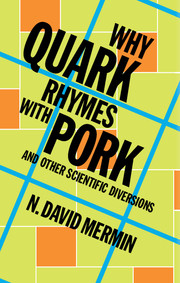Book contents
- Frontmatter
- Dedication
- Contents
- Preface
- Part One Reference Frame Columns, Physics Today 1988–2009
- Part Two Shedding Bad Habits
- Part Three More from Professor Mozart
- Part Four More to be Said
- 36 The complete diary of a Nobel guest, unpublished, 1996
- 37 Elegance in physics, unpublished lecture, Minneapolis, 1999
- 38 Questions for 2105, unpublished lecture, Zurich, 2005
- Part Five Some People I've Known
- Part Six Summing it Up
- Index
37 - Elegance in physics, unpublished lecture, Minneapolis, 1999
from Part Four - More to be Said
Published online by Cambridge University Press: 05 January 2016
- Frontmatter
- Dedication
- Contents
- Preface
- Part One Reference Frame Columns, Physics Today 1988–2009
- Part Two Shedding Bad Habits
- Part Three More from Professor Mozart
- Part Four More to be Said
- 36 The complete diary of a Nobel guest, unpublished, 1996
- 37 Elegance in physics, unpublished lecture, Minneapolis, 1999
- 38 Questions for 2105, unpublished lecture, Zurich, 2005
- Part Five Some People I've Known
- Part Six Summing it Up
- Index
Summary
The problem with giving a lecture on elegance in physics is that much better physicists have already said a lot about it. This is well-worn ground. The great astrophysicist Subrahmanyan Chandrasekhar began a lecture on “Beauty and the Quest for Beauty in Science” [1] by remarking that “The topic to which I have been asked to address myself is a difficult one, if one is to avoid the trivial and the banal.” So I cannot even comment on the risk of triviality and banality without engaging in them.
Clearly I cannot tell you about how Maxwell's equations for the electromagnetic field used to fill an entire page and require ten different letters of the alphabet for their expression, even in empty space. But then with the invention of vectors, Maxwell's equations shrank to four lines and three letters. The added insights of relativity reduced them to one letter and one line, thereby condensing the hard-won insights of Coulomb, Oersted, Faraday, and Maxwell himself to a degree of concise precision none of them could have imagined.
Nor can I wax lyrical about the extraordinary power and economy of Dirac's formulation of quantum mechanics, which makes transparently lucid the equivalence of Schrödinger's and Heisenberg's superficially different formulations of the fundamental theory, as well as simplifying many formerly complicated calculations into a few almost self-evident lines.
And certainly I cannot say anything about the great conservation laws of energy, momentum, and angular momentum, and how they can be understood as consequences of the simple symmetries of our universe—that things happen the same way regardless of when they happen, where they happen, or how they are oriented.
All of this has been said too often to repeat any of it.
What I can do is tell you about a few less lofty things: attitudes of physicists toward elegance in their discipline, and a few very down-to-earth examples of what I would consider elegant.
Physicists are ambivalent about elegance. When I received the invitation to give this lecture all I could think of was “Elegance is for tailors.” That succinct dismissal of the theme of this series is probably the most celebrated remark any physicist has ever made about the role of elegance in physics. But instead of thinking about my assigned topic, I began by worrying about who had said it.
- Type
- Chapter
- Information
- Why Quark Rhymes with PorkAnd Other Scientific Diversions, pp. 283 - 295Publisher: Cambridge University PressPrint publication year: 2016



